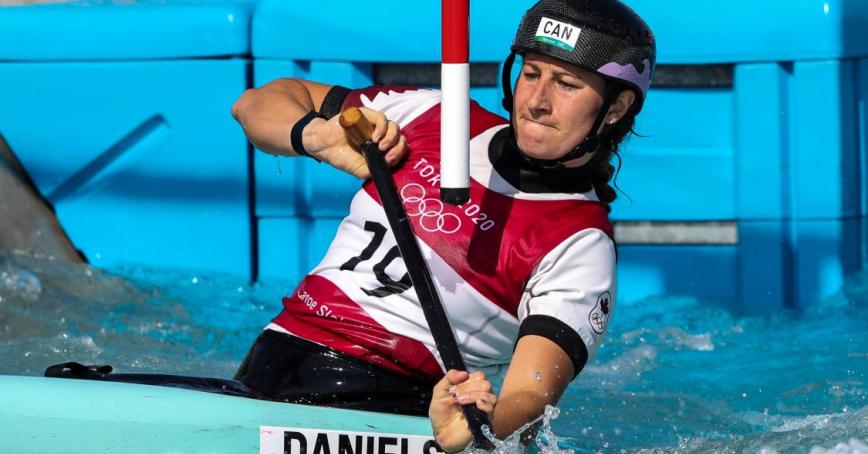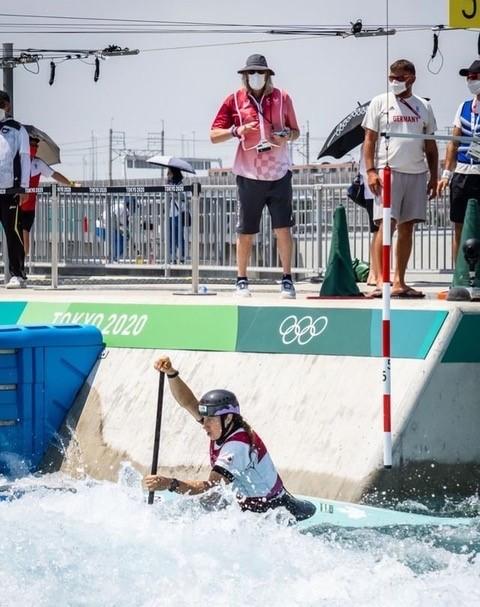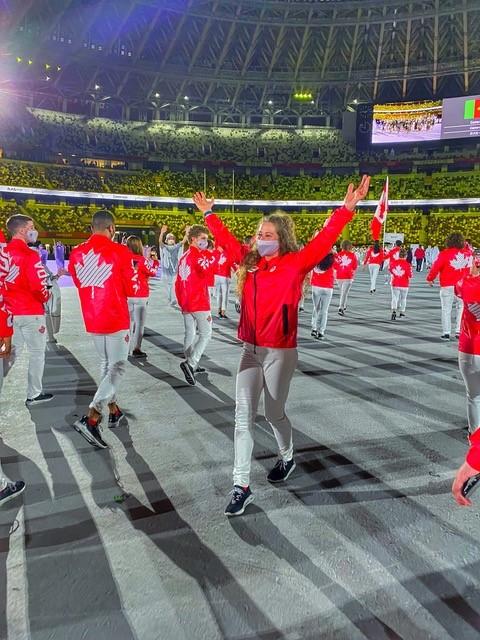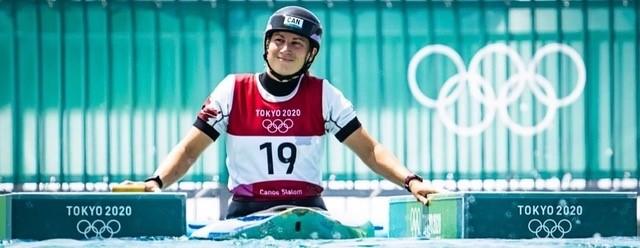Olympic paddler makes history in Tokyo

On the one hand, Haley Daniels says she is disappointed, not to mention exhausted due to hard work and jetlag. An elite paddler, she trained for years to compete in the Olympics and two small mistakes cost her the chance to advance to the medal round in her event in Tokyo, sending her back home to Calgary.
On the other hand, Daniels did much more than medal — she made Olympic history.
The Royal Roads University student was among the first women ever to compete in Olympic canoe slalom after she’d lobbied for years for women’s canoe events included, equal to their male counterparts’, at the Summer Games.
“For me, it was so much sweeter getting to Tokyo because I knew how hard I fought to get there and I knew how special it was to be a part of history,” she says.
“The minute I crossed the start line, no matter how my run went, I was just so proud to be there and so excited that we were able to break barriers for gender equality. I think about my career as a women’s canoeist and there’s been a lot of adversity, and a lot of times when I’ve had to just fight for my right on the water, to continue, and for funding.”
Tokyo wasn’t the first time Daniels has made history. In 2015 in Toronto, she won a bronze medal in the first Pan American Games to feature women’s canoe events.

A family making history
A competitive paddler since the age of 10 and a competitor on the ICF World Cup circuit since 2009, the 30-year-old and other racers had previously visited Japan for pre-Olympic test events. But when she arrived for Olympic competition, the experience was different; viewing stands had been erected along the river and, from the moment she landed, the Tokyo 2020 logos and iconic rings were everywhere.
“When I got to the airport,” she says, “I cried.”
And when she got into the water, on a course with which she was familiar, she found herself placing her hand on the Olympic rings at the riverside and thinking, “Whoa, OK. This is something I’ve been working towards my entire life and it’s here.”
And she wasn’t alone, either on the course or in writing history. Because from her place at the start line, she could see her father, Kimberley, a gate judge and the first openly transgender official at an Olympics. (In the photo above right, Daniels competes while proud parent Kimberley watches from above.)
“When we set out for this journey to go towards the Olympics, my dad started judging so that she could come and watch me at races. Then she eventually became the Olympic level, which was kind of cool.
“Then we both kind of fell into breaking barriers and being first… It’s pretty amazing and I’m super proud of my dad and super proud of what we’ve done.”

School and a game plan
She’s not sure what she’ll do next competitively, though she notes the Paris 2024 Olympics are less than three years away. For now, she’s working on her Bachelor of Commerce in Entrepreneurial Management at Royal Roads, a program Daniels says she wishes she’d known about six or seven years ago. Given her experience with fundraising and finding sponsorships, she has an interest in sponsorship marketing as well as business development and communications.
The flexibility and mostly online format of the program suits not only professionals but top-level athletes’ training schedules, she says, noting she abandoned pursuit of a degree at another institution to enroll at RRU.
Daniels also lauds the help of Game Plan, a collaboration between the Canadian Olympic and Paralympic committees, Sport Canada and Canadian Olympic and Paralympic Sport Institute Network that aims to support national team athletes so they can focus on health, education, and career opportunities both during and after their sporting careers.
Looking ahead to a life after international competition, she says, “It’s hard because you go from the height of your career to basically the bottom of whatever’s next… So knowing that there’s support when you’re going through that is really important.”

Accommodating athletes
Dr. Jennifer Walinga agrees — and she knows what she’s talking about. A former high-level rower who won Olympic, Commonwealth and world championship gold medals for Canada — as well as a professor and researcher in Royal Roads’ School of Communication and Culture with a focus on sport leadership and organizational change — she says elite athletes need to be supported throughout their careers, and that includes helping them access education.
Some athletes are able to earn a bachelor’s degree but, with specialization, year-round and centralized training, that door is closed to many without additional flexibility or accommodations.
“If there could be a game plan early, then you are more relaxed, you’re comforted by the fact you’re able to work on your education,” Walinga says. “It also provides balance and that’s essential.”
She’s part of Royal Roads’ outreach to top athletes and says as much as they benefit from getting a university education, they also bring value to the learning environment because of their experiences.
“I think it’s really important for the institution to accommodate athletes because athletes are leaders,” she says. “It’s a real benefit to have these students in the community, the student body of any institution.
“Sport has a lot to teach us.”
(Photo credits: Top photo by Bence Vekassy, Canoe Kayak Canada. Second photo, Haley and Kimberley Daniels by Dave Holland. Third and fourth photo courtesy Haley Daniels.)